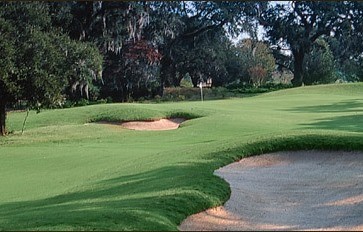Chinese investors who have bought golf courses in the U.S. have organized plans to revive interest in the sport, as well as in the business of golf vacation and real estate, to attract investors and players from China.
Chinese investment into golf courses started when Yiqian Funding, a Chinese peer-to-peer lender, and other Chinese investors bought in cash 22 golf courses from September to April last year, including the Pine Lakes, the oldest course on the Grand Strand, a fertile coastal strip that includes Myrtle Beach and stretches 60 miles along the Atlantic Ocean.
"It's a big change for the golf business," Dou, president of Founders Group International, the group that manages the 22 courses, said. "Maybe we are crazy. Maybe we bought too many courses. But I think the market is at the bottom and will come back."
Dan Liu, chairman of Yiqian Funding, and his partner Dou plan to attract players and investors from China with their new condos and courses, which include the top-rated TPC Myrtle Beach and Grand Dunes Resort Club.
Some owners doubted the prospects that Chinese visitors will flocked to Myrtle Beach due to distance, since it would take at least 15 hours, with one stopover, to fly from Shanghai to Myrtle Beach. Besides, most Chinese prefer to go to California and Las Vegas than any other place in the U.S.
"It's very difficult to get here," said Mike Buccerone, president of East Coast Golf Management, which operates six courses on the Strand. "You have to fly over a lot of places--California and Las Vegas--where the Chinese like to go. You have more opportunity for people coming from our own country than internationally. "
But Liu brushed aside the problem and remained hopeful. In only six years, Liu turned Yiqian Funding in Nanjing into a firm with more than 6,000 employees and $1.2 billion in annual home and business loans.
Dou, on the other hand, said that he plans to add as many as 1,000 branch offices to sell golf vacations and real estate in Myrtle Beach.
Dou added that the Chinese government's restrictions on extravagance and that the unauthorized courses could drive Chinese golfers to destinations like Myrtle Beach.
"The Chinese golfer could help us turn around our industry from no growth to fast growth," said Brad Dean, president of the local Chamber of Commerce, who visited China to promote tourism to Myrtle Beach. The chamber lured a record 17.2 million visitors last year.
When Liu and Duo remodelled clubhouses and upgraded the golf courses, they also started the construction of 80 homes. They also bought about 2,000 to build houses and condos and also sold 20 units to Chinese buyers for $200,000 and $300,000 each in June.
"Maybe the golf business isn't so good, but you can make money from the real estate," Dou said.
Liu is also planning to develop an oceanfront hotel and build a home at his World Tour Golf Club, as he and his family will be moving to Myrtle Beach in August.



























